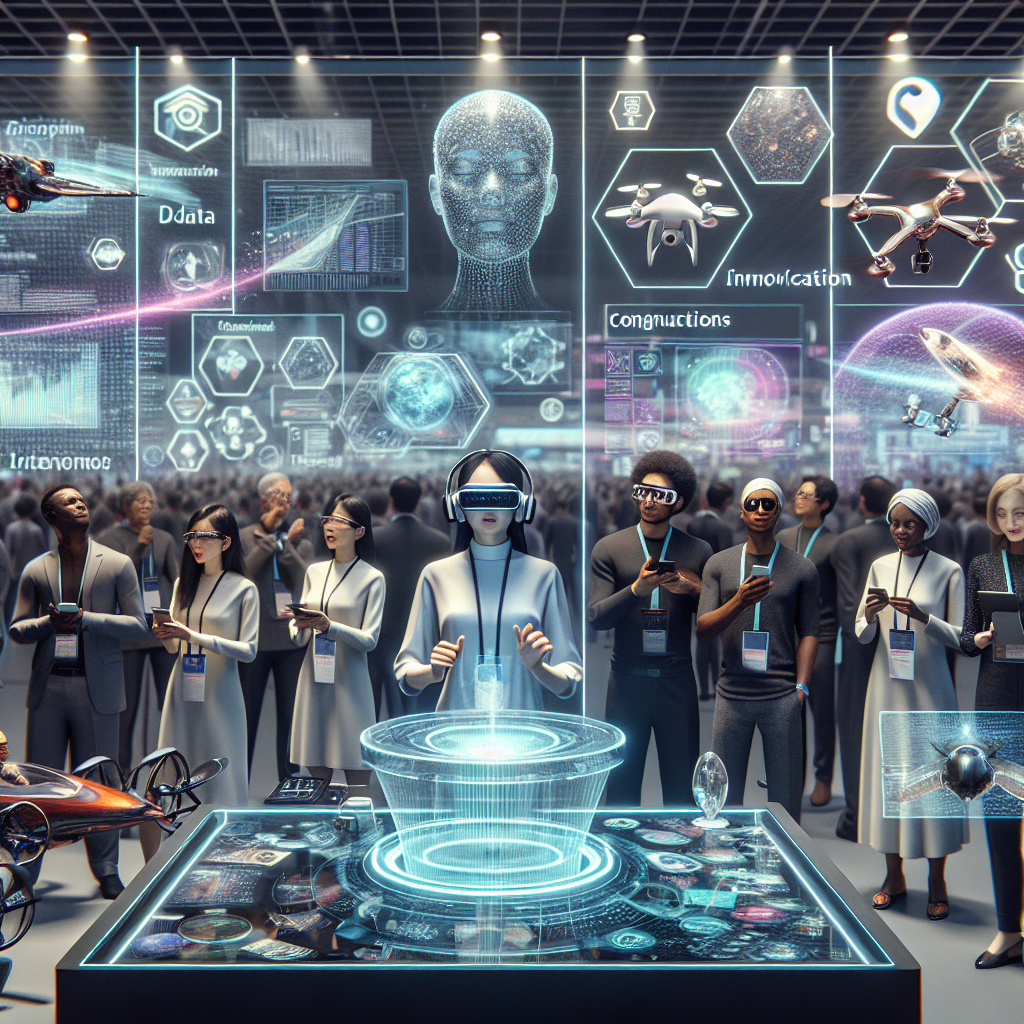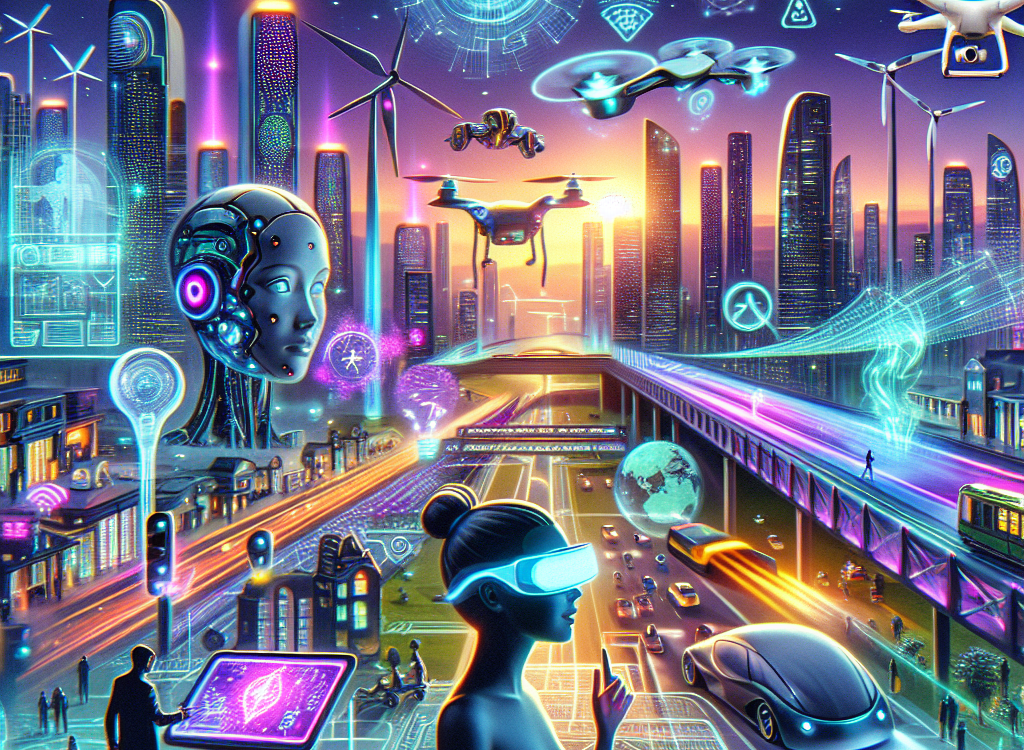What To Know
- As we embrace the potential of AI, it is important to navigate the future of innovation responsibly, addressing ethical concerns and ensuring that AI benefits all of society.
- The Internet of Things (IoT) has been a buzzword in the tech industry for several years now, and its impact on our daily lives is only expected to grow in the coming years.
Artificial Intelligence: Revolutionizing Industries in 2024
Artificial Intelligence: Revolutionizing Industries in 2024
In the fast-paced world of technology, artificial intelligence (AI) has emerged as a game-changer. With its ability to mimic human intelligence and perform tasks that were once exclusive to humans, AI is revolutionizing industries across the globe. As we look ahead to 2024, it is clear that AI will continue to shape the future of innovation.
One of the key areas where AI is making a significant impact is healthcare. In 2024, AI-powered systems will play a crucial role in diagnosing diseases, predicting patient outcomes, and even assisting in surgeries. With the ability to analyze vast amounts of medical data and identify patterns that humans might miss, AI is helping doctors make more accurate diagnoses and provide personalized treatment plans. This not only improves patient outcomes but also reduces healthcare costs.
Another industry that is being transformed by AI is transportation. In 2024, we can expect to see self-driving cars become a common sight on our roads. These vehicles, powered by AI algorithms, will not only make our commutes safer but also more efficient. With the ability to communicate with each other and make split-second decisions, self-driving cars will reduce traffic congestion and improve fuel efficiency. Additionally, AI will enable the development of smart transportation systems that optimize routes, predict traffic patterns, and provide real-time updates to commuters.
The retail industry is also experiencing a revolution thanks to AI. In 2024, AI-powered chatbots and virtual assistants will become the norm in customer service. These intelligent systems will be able to understand and respond to customer queries, provide personalized recommendations, and even process transactions. By automating routine tasks, AI will free up human employees to focus on more complex and value-added activities. Furthermore, AI will enable retailers to analyze customer data and gain insights into consumer behavior, allowing them to tailor their offerings and marketing strategies accordingly.
AI is not only transforming individual industries but also driving innovation in the field of robotics. In 2024, we can expect to see robots that are more intelligent, versatile, and capable of performing a wide range of tasks. From manufacturing to healthcare, robots powered by AI will work alongside humans, augmenting their capabilities and increasing productivity. These robots will be able to learn from their environment, adapt to changing circumstances, and collaborate with humans in a seamless manner. The integration of AI and robotics will not only revolutionize industries but also create new job opportunities and redefine the way we work.
As we navigate the future of innovation in 2024, it is important to address the ethical implications of AI. With the increasing reliance on AI systems, questions of privacy, bias, and accountability arise. It is crucial to ensure that AI is developed and deployed in a responsible and transparent manner. This includes addressing issues such as data privacy, algorithmic bias, and the potential impact of AI on employment. By establishing ethical guidelines and regulations, we can harness the power of AI while mitigating its risks.
In conclusion, artificial intelligence is revolutionizing industries in 2024 and beyond. From healthcare to transportation, retail to robotics, AI is transforming the way we live and work. As we embrace the potential of AI, it is important to navigate the future of innovation responsibly, addressing ethical concerns and ensuring that AI benefits all of society. With AI as our ally, we can unlock new possibilities and shape a future that is both innovative and inclusive.
Internet of Things (IoT): Connecting the World in 2024

The Internet of Things (IoT) has been a buzzword in the tech industry for several years now, and its impact on our daily lives is only expected to grow in the coming years. By 2024, the IoT is set to revolutionize the way we live, work, and interact with the world around us.
One of the key areas where the IoT is expected to make a significant impact is in our homes. Smart homes, equipped with connected devices and appliances, will become the norm rather than the exception. Imagine a home where you can control the temperature, lighting, and security systems with just a few taps on your smartphone. With the IoT, this will become a reality.
But it’s not just our homes that will be transformed by the IoT. The IoT will also have a profound impact on industries such as healthcare, transportation, and agriculture. In healthcare, for example, connected devices will enable doctors to remotely monitor patients and provide personalized care. In transportation, connected cars will communicate with each other and with traffic infrastructure to reduce congestion and improve safety. And in agriculture, sensors and drones will help farmers optimize crop yields and reduce waste.
The IoT will also play a crucial role in the development of smart cities. By 2024, cities around the world will be equipped with sensors and connected devices that will collect and analyze data to improve efficiency and quality of life. For example, smart streetlights will automatically adjust their brightness based on the presence of pedestrians and vehicles, reducing energy consumption and improving safety. Smart waste management systems will optimize garbage collection routes, reducing costs and minimizing environmental impact. And smart parking systems will help drivers find available parking spaces, reducing congestion and frustration.
However, with the increased connectivity and data sharing that the IoT brings, there are also concerns about privacy and security. As more and more devices become connected, the potential for cyberattacks and data breaches increases. It will be crucial for companies and individuals to prioritize cybersecurity and implement robust measures to protect sensitive information.
Another challenge that the IoT will face in the coming years is the interoperability of devices and platforms. With so many different manufacturers and technologies in the market, ensuring that devices can communicate and work together seamlessly will be essential. Standardization efforts will be crucial to overcome this challenge and unlock the full potential of the IoT.
In conclusion, the Internet of Things is set to revolutionize the way we live, work, and interact with the world around us by 2024. From smart homes to connected cars and smart cities, the IoT will bring about significant changes in various industries. However, it is important to address concerns about privacy and security and work towards interoperability to fully harness the potential of the IoT. As we navigate the future of innovation, the IoT will undoubtedly play a central role in shaping our world.
Blockchain Technology: Transforming Business Processes in 2024
Blockchain Technology: Transforming Business Processes in 2024
In the ever-evolving landscape of technology, one trend that is set to revolutionize the way businesses operate is blockchain technology. With its decentralized and transparent nature, blockchain has the potential to transform various industries and streamline business processes. As we look ahead to 2024, it is crucial for businesses to understand the implications and opportunities that blockchain presents.
First and foremost, let’s delve into what exactly blockchain technology is. At its core, blockchain is a digital ledger that records transactions across multiple computers. These transactions are grouped together in blocks and linked to previous blocks, forming a chain. What sets blockchain apart is its decentralized nature, meaning that no single entity has control over the entire network. This decentralization ensures transparency and security, as each transaction is verified by multiple participants in the network.
One of the key advantages of blockchain technology is its ability to enhance security and trust in business processes. Traditional methods of record-keeping and transaction verification often rely on centralized systems, which are vulnerable to hacking and manipulation. With blockchain, every transaction is recorded and verified by multiple participants, making it nearly impossible to alter or tamper with the data. This increased security not only protects businesses from potential cyber threats but also builds trust among customers and stakeholders.
Furthermore, blockchain technology has the potential to streamline supply chain management. In industries such as manufacturing and retail, supply chains can be complex and involve multiple parties. Blockchain can provide a transparent and immutable record of every transaction and movement of goods, from raw materials to the final product. This transparency enables businesses to track and trace products, ensuring authenticity and quality control. Additionally, blockchain can automate processes such as inventory management and payment settlements, reducing administrative costs and improving efficiency.
Another area where blockchain technology is set to make a significant impact is in the financial sector. Traditional banking systems often involve intermediaries and lengthy processes for transactions and settlements. Blockchain has the potential to eliminate these intermediaries, enabling peer-to-peer transactions and reducing transaction fees. Smart contracts, which are self-executing contracts with the terms of the agreement directly written into code, can automate and streamline financial processes, such as loan approvals and insurance claims. This automation not only saves time but also reduces the risk of human error.
Moreover, blockchain technology can revolutionize the way intellectual property is protected and managed. In industries such as music, art, and publishing, copyright infringement and piracy are major concerns. Blockchain can provide a decentralized and transparent platform for creators to register and protect their intellectual property rights. By recording ownership and usage rights on the blockchain, creators can ensure that their work is protected and receive fair compensation for its use. This has the potential to empower artists and creators, while also deterring piracy and unauthorized use.
In conclusion, blockchain technology is poised to transform business processes in 2024 and beyond. Its decentralized and transparent nature enhances security, trust, and efficiency in various industries. From supply chain management to financial transactions and intellectual property protection, blockchain has the potential to revolutionize the way businesses operate. As we navigate the future of innovation, it is crucial for businesses to embrace and leverage the opportunities that blockchain presents. By doing so, they can stay ahead of the curve and thrive in the ever-changing technological landscape.
